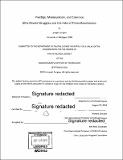Prestige, manipulation, and coercion : elite power struggles and the fate of three revolutions
Author(s)
Torigian, Joseph (Joseph P.)
DownloadFull printable version (43.46Mb)
Alternative title
Elite power struggles and the fate of three revolutions
Other Contributors
Massachusetts Institute of Technology. Department of Political Science.
Advisor
Richard Samuels.
Terms of use
Metadata
Show full item recordAbstract
How do leaders win power struggles in Leninist regimes? Many political scientists emphasize the importance of institutions in such regimes. Such institutionalization allegedly provides a mechanism for distributing patronage and debating policies, stipulates rules that delineate a group that selects the leadership, and prevents the military and secret police from playing a special coercive role. This dissertation instead argues that the defining feature of one-party states is weak institutionalization. Power struggles are therefore determined by prestige and sociological ties, the manipulation of multiple decision-making bodies, and politicized militaries and secret police. Leaders with legacies as successful warfighters are especially capable of dominating such systems. Institutionalization can only explain why elites do not pointlessly and unnecessarily violate ambiguous rules, losers rarely defect from the party or resist decisions after suffering defeat, and the coercive organs never blatantly wield force against united civilian leaders. These arguments are based on a theoretically rigorous examination of the power struggles fought by Nikita Khrushchev, Deng Xiaoping, and Kim Il Sung. The historic failure to institutionalize leadership selection had a tragic legacy: its absence is crucial for understanding the origins of Soviet stagnation, the tragedy at Tiananmen Square in 1989, and the Kim family multi-generational personality cult.
Description
Thesis: Ph. D., Massachusetts Institute of Technology, Department of Political Science, 2016. Cataloged from PDF version of thesis. Includes bibliographical references.
Date issued
2016Department
Massachusetts Institute of Technology. Department of Political SciencePublisher
Massachusetts Institute of Technology
Keywords
Political Science.